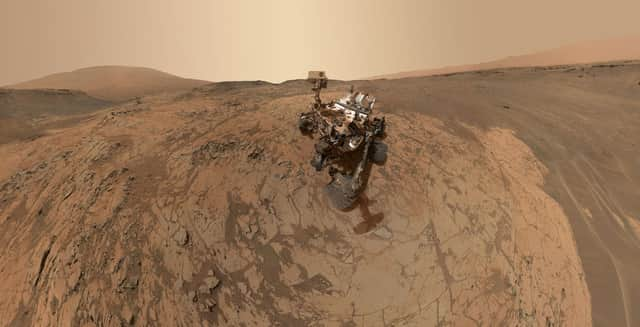Mars: Nasa will not be able to reach its robots for two weeks as they worry about spiralling costs of a new mission


All of Nasa's Mars rovers will be out of commission for the next two weeks as the space agency must wait out a natural phenomenon that will prevent normal communications. The Red Planet and Earth have reached solar conjunction - where their positions in their orbits have put them on opposite sides of the sun.
Nasa said any attempts at communication could be risky as interference from the sun could have a detrimental effect and taking a planned break will keep the rovers safe.
Advertisement
Hide AdAdvertisement
Hide AdThe pause in communication began on Saturday (11 November) and will end on 25 November. The Mars solar conjunction happens every two years, and while the rovers will be able to send basic health updates, they’ll go completely silent for the two days when the sun blocks Mars entirely.
The robots, Perseverance and Curiosity rovers, the Ingenuity helicopter, the Mars Reconnaissance Orbiter, and the Odyssey and MAVEN orbiters will be on their own for a little while.
This comes as Nasa announces a new mission where a fleet of unmanned probes and robot rovers will be flown to Mars to gather rock samples which will then be blasted back to Earth for study for signs of life.
Known as the Nasa’s Mars Sample Return, it will involve the first-ever space launch from another planet, as well as the first-ever rendezvous in orbit around another planet. However, this mission may mean several other missions will be cancelled due to its spiralling cost. The original $4.4bn price tag is likely to soar to $8-11bn.
Advertisement
Hide AdAdvertisement
Hide Ad“The Mars Sample Return was established with unrealistic budget expectations,” says the panel’s report. “There is currently no credible, congruent technical, nor properly margined schedule, cost and technical baselines that can be accomplished with the likely available funding.” In fact, there is “near zero probability” of Nasa’s plan succeeding on its current budget, the board concluded.
Comment Guidelines
National World encourages reader discussion on our stories. User feedback, insights and back-and-forth exchanges add a rich layer of context to reporting. Please review our Community Guidelines before commenting.
